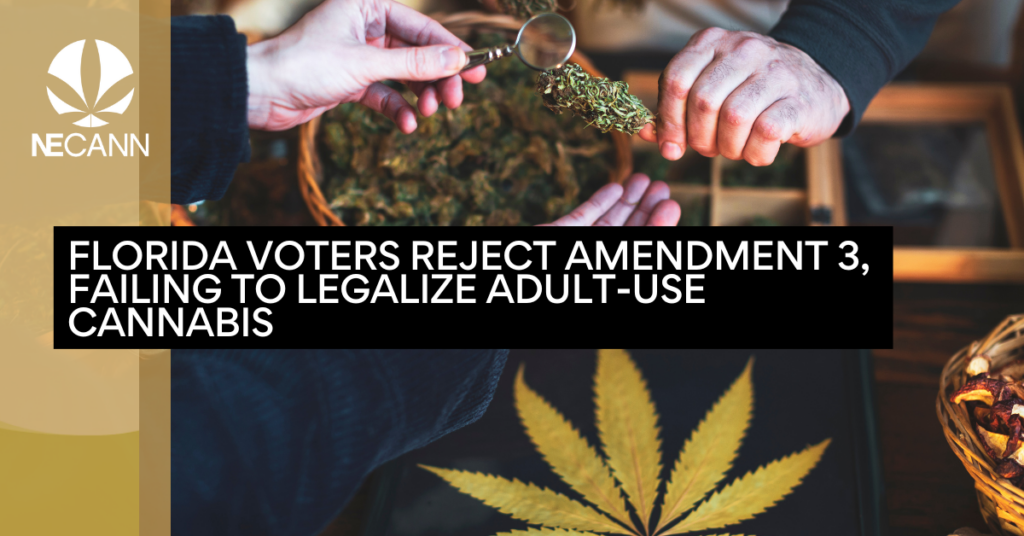Florida voters ejected Amendment 3, a constitutional amendment that would have legalized adult-use cannabis in the state. With 95% of precincts reporting, the amendment garnered only about 57% support, falling short of the 60% required for passage. Despite this setback, the campaign behind the initiative, Smart & Safe Florida, expressed optimism, noting that a “strong majority” of voters were in favor of cannabis legalization and emphasized their commitment to working with lawmakers to pursue future reforms.
The amendment campaign was primarily funded by Trulieve, Florida’s largest medical cannabis company. Smart & Safe Florida raised approximately $150 million to push the initiative, making it one of the most well-funded campaigns in the state’s history. The proposal would have allowed adults 21 and older to legally possess and use cannabis, regulated in much the same way as alcohol. Proponents of the amendment argued that legalizing cannabis would not only provide significant tax revenue for the state but also address issues of social justice by reducing arrests related to cannabis possession.
In a statement after the results, Smart & Safe Florida expressed gratitude to the majority of voters who supported the amendment. “While we didn’t clear the 60 percent threshold, we are committed to working with the governor and legislative leaders who support decriminalizing recreational marijuana for adults,” said the campaign. The statement also highlighted the importance of child safety, expanding access to safe cannabis, and allowing home cultivation for medical cannabis patients as key areas for future efforts.
The push for adult-use cannabis legalization has seen momentum in other parts of the U.S., with several states adopting similar reforms in recent years. However, Florida’s political landscape remains divided on the issue, with significant opposition from some of the state’s most influential leaders.
Florida Governor Ron DeSantis (R) was one of the most vocal opponents of the amendment, actively campaigning against it. DeSantis argued that legalizing adult-use cannabis would have negative consequences for the state, including unpleasant odors and a reduction in the quality of life for Floridians. His opposition was echoed by Dr. Jessica Spencer, the director of advocacy for the Vote No on 3 Campaign, who praised the governor and First Lady for their unwavering stance against cannabis legalization.
In a statement, Spencer thanked the governor for his “conviction, courage, and fearlessness,” even in the face of significant financial backing from the cannabis industry. “The $150-million cash bomb from Big Weed did not sway Floridians,” Spencer said, highlighting the strength of the opposition campaign.
The political battle over cannabis legalization in Florida became even more complex in the lead-up to the vote. While DeSantis maintained a hardline stance against the measure, Republican presidential candidate Donald Trump came out in support of the amendment. In September, Trump publicly stated that he would vote ‘yes’ on Amendment 3 and voiced support for federal cannabis rescheduling. His endorsement was seen as a notable shift, as many Republicans, particularly in Florida, had long opposed cannabis reform.
Although Amendment 3 was defeated, the conversation around cannabis legalization in Florida is far from over. Smart & Safe Florida vowed to continue advocating for cannabis reform and emphasized that they would work with lawmakers who support decriminalization and other cannabis-related issues. The strong voter support for the amendment, despite falling short of the 60% threshold, indicates that there is significant public interest in cannabis legalization in Florida.
One area where the campaign may find common ground with lawmakers is in addressing the state’s medical cannabis program. Florida already has a robust medical cannabis industry, and expanding access to adult-use cannabis could be seen as a natural progression. However, the defeat of Amendment 3 highlights the challenges of legalizing cannabis in a state where political leaders are deeply divided on the issue.
The rejection of Amendment 3 also signals that, while public support for cannabis legalization continues to grow across the country, the path to reform in Florida will likely remain a contentious one. As seen in other states, achieving full legalization often requires years of legislative work, and the next step for cannabis advocates in Florida may involve pushing for smaller reforms, such as the expansion of medical cannabis access or the decriminalization of possession.
The defeat of Amendment 3 also reflects broader national trends regarding cannabis legalization. While many states have embraced adult-use cannabis, others remain hesitant, influenced by local political dynamics and the ongoing federal prohibition of cannabis. Despite this, the growing support for legalization, as seen in Florida, suggests that it may only be a matter of time before more states adopt cannabis reforms.
In addition to cannabis issues, Florida voters also rejected Amendment 4, a measure aimed at codifying women’s right to an abortion in the state constitution. The results on both issues highlight the polarized political environment in Florida, where key social and public health reforms continue to face strong opposition.
While Amendment 3’s failure marks a setback for cannabis advocates in Florida, the fight for cannabis reform in the state is far from over. With growing public support, proponents remain committed to pursuing future reforms through legislative action. As the debate continues, it is clear that cannabis legalization will remain a prominent issue in Florida politics.
For more updates on cannabis industry news and business insights, subscribe to NECANN.



